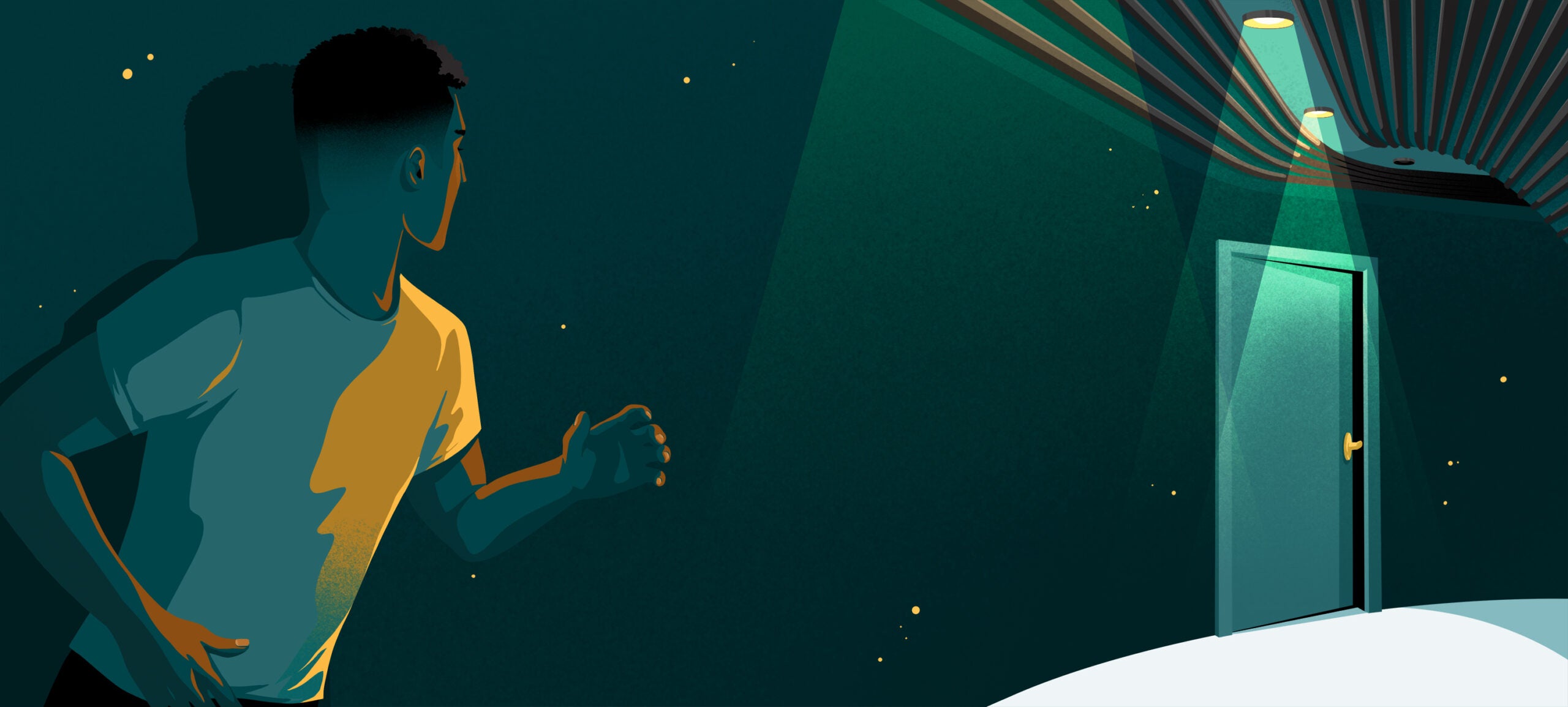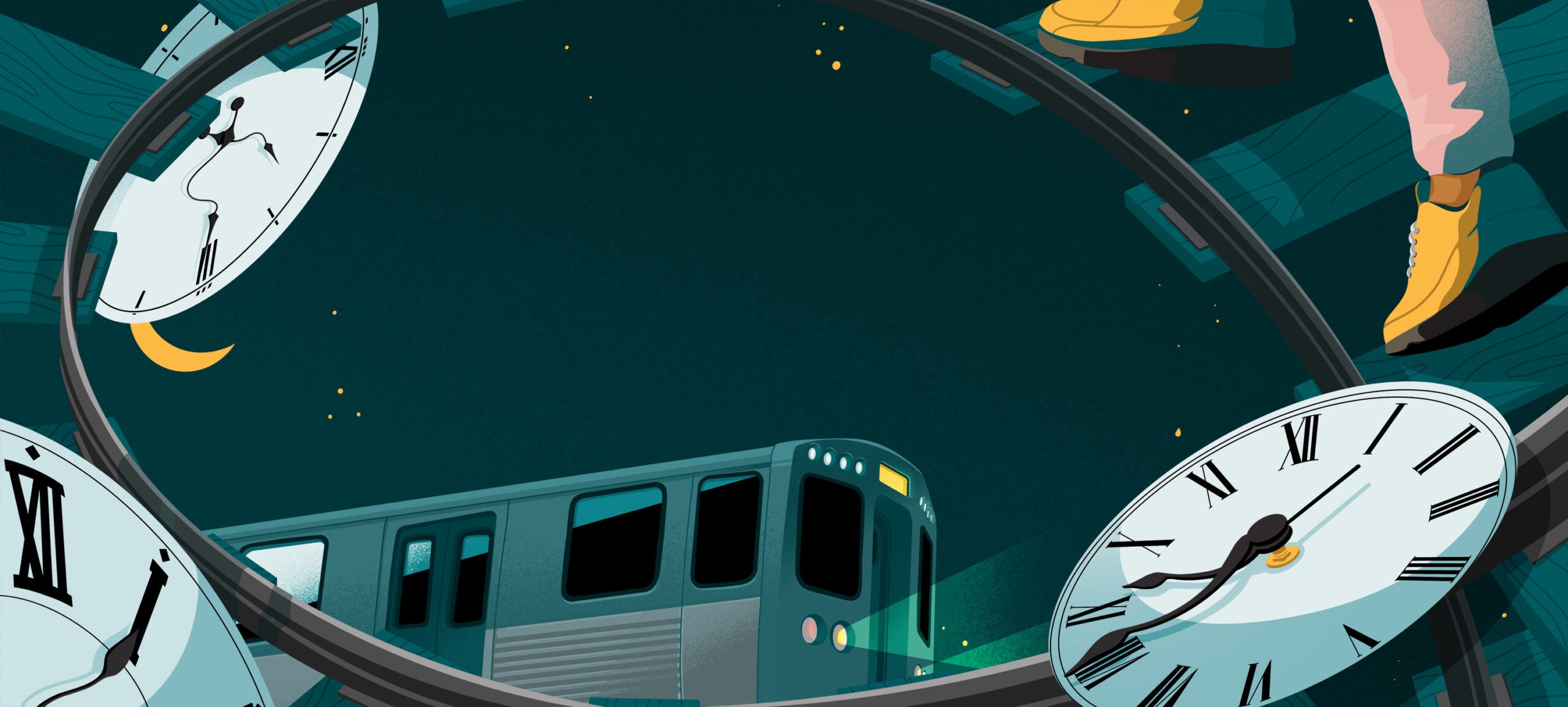You slip into the back row at your ex’s wedding, hoping to remain unobserved, but then you realize you’re naked. You open your mouth to give a big presentation at work, and suddenly all your teeth fall out. Or you’re sitting in a final exam for a class you’ve never attended.
When you wake up and realize you’ve been dreaming, images fade quickly, but the feelings they evoke can linger into your morning.
Everyone dreams, and while many of our dreams share common themes, each nightly story is singular and personal, weaving together fragments of memory, imagination, and emotion. Though experts have compelling theories, why we dream and what dreams mean aren’t well understood — but that doesn’t mean you should dismiss dreams as weird mental home movies.
Instead, you can use your dreams to tap into insights and meaning in your life.

Common themes in dreams
“Although we’re unique as dreamers, some types of dreams seem to be consistent across cultures and history. This makes sense, as humans share similar emotions,” says Sanam Hafeez, PsyD, New York City-based neuropsychologist and director of Comprehend the Mind, an assessment and treatment center.
And then there are shared experiences. According to a 2015 study of Chinese and German students, the most commonly reported theme was around school, teachers, and studying. Of course, study participants were all in academia, so their everyday experience involved those themes already.
Current events and ongoing emotional challenges such as anxiety can also play a part in your sleep narrative. One 2021 study involving Italians who were under lockdown during the early months of the COVID-19 pandemic found that their frequency of dreams and nightmares increased, particularly around fear of contagion.
Generally, though, many dreams center on feelings of vulnerability, anxiety, grief, loss, and fear — all intense emotions that people often wrestle with. There’s joy as well, such as excitement, desire, or freedom.
Dream dictionary
Evidence-based medicine doesn’t validate the role and legitimacy of dream interpretation, says W. Christopher Winter, MD, president of Charlottesville Neurology and Sleep Medicine in Virginia, and author of “The Sleep Solution” and “The Rested Child.” That said, there are some widely accepted (but not scientifically proven) interpretations of common themes, including:
Being chased
You may be avoiding an issue or a person that you feel might be harmful to you, triggering your fight-or-flight response.
Falling
If you’re fearful in the dream, it could mean you feel out of control about a situation.
Being in school
You may have unresolved issues about not living up to expectations, or feel that you’re unprepared for something important.
Flying or floating
You may feel a sense of freedom or hope, especially if you can control your flight path in your dream. Flying is often interpreted positively as freedom from obstacles.
Running late
Dreams about rushing for trains, planes, or buses may represent a missed opportunity. They could also be related to a fear of not living up to expectations, or general insecurity.
Being stressed at work
These dreams tend to literally reflect anxiety about a professional situation. Maybe you’re anxious about botching a big presentation or missing a deadline.
Teeth falling out
At a basic level, losing teeth, breaking a bone, or experiencing some other physical health issue often all reflect deep personal loss of some kind, but can also refer to concern about upcoming changes.
Seeing someone who’s dead
Dream interpretation here leans on how you felt about that person. If the person was beloved by you, this could simply reflect that you’re still mourning. If the person hurt you or caused fear, that could mean you’re still carrying those feelings.
Being frozen with fear
This could mean you feel cut off from your feelings, but it may also be a response to sleep paralysis, which happens during the rapid eye movement (REM) sleep stage. If REM is still in progress, but your mind wakes up, you may experience a few seconds of actual paralysis in your body.
Having sex
Interpretation here will depend on what’s happening in the dream and how you feel about it. These dreams are very common, and may indicate normal sexual arousal or a desire for more intimacy and connection.
Being naked
This could tie to feelings of insecurity, vulnerability, or being judged (especially if people around you in your dream are fully clothed).
Being abandoned
If you’re relieved to be on your own in your dream, being “abandoned” may be interpreted as a step toward independence. If you feel left out or left behind, that could reflect feeling neglected or unseen in everyday life.
What does it all mean?
“Not surprisingly, dream interpretation is tricky,” says Hafeez. While the list above gives some possible explanations, there’s no definitive reference or agreement when it comes to what a dream might mean. Psychologists like Sigmund Freud and Carl Jung came up with theories that are still used today — mainly that dreams are expressions of repressed wishes and represent our subconscious desires or challenges — but these are only theories.
Even so, Hafeez says dreams can be a tool that helps you understand the mind in a new way. When you have that perspective of curiosity, dreams might give you a starting point for examining what’s going on in your life.

Psychology and neuroscience of dreaming
“Dreams allow people to recall memories and process new information,” explains Hafeez.
Sleep and dreaming aid the brain in making connections, solving problems, and shifting perspectives, which are all crucial in the creative process. They may even play a role in neuroplasticity, which refers to your brain’s ability to adapt physically — effectively “rewiring” neural pathways — in response to experience.
“We know the brain is able to bend and adjust when new changes take place,” Hafeez says. For example, people who lose their vision often experience intensification of other senses as their brains adapt. “When you sleep, your brain is wide awake and firing in unique patterns. Active areas include the hippocampus, amygdala, and visual cortex, which are all responsible for processing memories, emotions, and images.”
One prevailing theory in dream research is that this nightly exploration is a way to organize the huge amount of information that’s received during the day, and to combine that with anticipation of what’s to come.
“There is evidence that memory fragments are being used in a specific way, and that’s to cue us up for some future event,” says Erin Wamsley, PhD, associate professor of psychology and neuroscience at Furman University.
In a 2021 study she led, participants in a sleep lab were awakened 13 times during the night and asked to recall their dream content. Over half of the dreams reported, about 53 percent, were tied to a memory, while 25 percent were related to specific impending events. About 37 percent of dreams involving a future event also included memories of past experiences. This was especially prevalent the longer the participants dreamed.
In terms of why many dreams tend to be so weird, Tufts University neuroscience researcher Erik Hoel, PhD, believes they’re strange by design. In a published
“When the system becomes too familiar with the data, it becomes biased toward anticipating certain outcomes,” Hoel explains. “That reduces how much it can learn. To counteract this, scientists introduce a degree of chaos and randomization. In a way, our brains are doing the same thing. They’re introducing weirdness as a way to expand our insight.”
You can test this out for yourself, he adds.
Try performing a new task today, one that you’ve never done. For example, if you’ve never practiced yoga, try doing a simple sequence of yoga poses 10 times. Or if you’re not a word puzzle person, try a handful of crossword puzzles today. Hoel says these types of pursuits often result in dreams featuring those activities … though your brain will often “weird them up” as a way to get them to stick in your mind more effectively.
Physiology of dreaming
If you want to try to tap into your nightly visions to gain insights about your life, it’s helpful to understand what’s going on in your body when you sleep, because this sets the scene for how extensive your dreams may be.
Dreaming is largely a phenomenon of a sleep stage called rapid eye movement or REM. During this stage, your eyes and the surrounding muscles are active, but the rest of your body is paralyzed, which is believed to be a mechanism that keeps you safe from physically acting out your dreams.
We usually start dreaming about 90 minutes after falling asleep, though this timeframe can vary based on factors like alcohol consumption, depression, or previous sleep deprivation. Once you’re in REM, you’ll cycle through sleep stages about every hour to 90 minutes, with progressive cycles becoming longer and more intense.
“An interesting phenomenon related to dreaming is that our brains have the ability to incorporate what is happening in reality into what we are dreaming,” says Winter.
“A beeping alarm might transform into a truck’s back-up beep in your dream. Sleep apnea patients who struggle to breathe often report having dreams of drowning or being chased. Our brains create a narrative around the feeling,” he says.

Harness your dreams
The moment you wake up, once-vivid images and storylines slip away quickly, sometimes so fast that you can’t even remember what you dreamed — though feelings like fear or happiness may stick around.
If dreams are such fleeting phenomena, how can you tap into greater understanding about your dreams? Hafeez offers these suggestions:
Train yourself to remember your dreams
- Jot down your dreams at night. If you get up to go to the bathroom, it will likely be after a REM cycle. Take this opportunity to make a few notes about your dreams. (Tip: Keep a notebook near a night light so you don’t wake up too much.)
- Take it slow in the morning. Allow yourself to drift in and out of sleep for a bit, and try to remember what you dreamed. Over time, you should be able to recall more.
- Write out your dreams. After letting your mind wander for a few minutes, write your dreams down as soon as you can. This will train your brain to retain dream information for longer and in more detail.
- Notice patterns. Identify recurring thoughts in your dreams and daily life, such as “I’m not going to succeed,” or “I’m always running behind — I’ll never catch up.”
Look for common themes
“From there, look for themes that relate to your previous day’s experience,” Hafeez suggests, and remember that dream images might be literal, but they could relate to deeper emotions in a figurative way.
“For example, if you’ve dreamed about missing some form of transportation, you can ask yourself what opportunity you feel you’ve missed out on, particularly in the 2 days before your dream,” she says.
If you dreamed of being naked, ask yourself if you’ve felt vulnerable in a public way, especially one you didn’t expect. For instance, you may be worried about getting called out by your boss in front of colleagues, or you want to talk with your in-laws about a big issue, but you’re concerned about “exposing yourself” to their scorn.
“Many psychotherapists and mental health professionals use dream work to make sense of deeper emotional states,” Hafeez adds. Working with a therapist and talking about your prevailing dream themes can help with self-awareness and problem-solving, and may lead to more exploration of issues like anxiety, control, and grief.
“Although working with a professional can be helpful, remember that you’re the expert,” Hafeez says.
“When it comes to your psyche, don’t stop trusting your inner guide to your unconscious,” she suggests. “Symbols have different meanings for different people. The key is to figure out what the dream means to you.”

